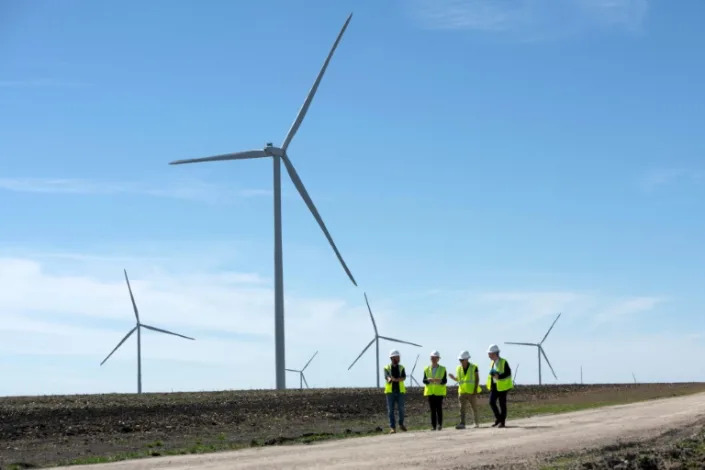LORD OF WAR; U$A GUNRUNNER
UN report: Modern weapons being smuggled to Haiti from US Firearms are displayed during a news conference at the Miami Field Office of the Homeland Security Investigations (HSI), that was working with other agencies to crack down on an increase of firearms and ammunition smuggling to Haiti and other Caribbean nations, on Aug. 17, 2022. Increasingly sophisticated weapons are being trafficked into Haiti mainly from the United States and especially from Florida amid worsening lawlessness in the impoverished Caribbean nation, according to a U.N. report released Friday, March 4, 2023.
Firearms are displayed during a news conference at the Miami Field Office of the Homeland Security Investigations (HSI), that was working with other agencies to crack down on an increase of firearms and ammunition smuggling to Haiti and other Caribbean nations, on Aug. 17, 2022. Increasingly sophisticated weapons are being trafficked into Haiti mainly from the United States and especially from Florida amid worsening lawlessness in the impoverished Caribbean nation, according to a U.N. report released Friday, March 4, 2023.
Fri, March 3, 2023
UNITED NATIONS (AP) — Increasingly sophisticated weapons are being trafficked into Haiti mainly from the United States and especially from Florida amid worsening lawlessness in the impoverished Caribbean nation, according to a U.N. report released Friday.
The report by the Vienna-based Office on Drugs and Crime said a network of criminal actors including members of the Haitian diaspora “often source firearms from across the U.S.” and smuggle them into Haiti illegally by land from the neighboring Dominican Republic, by air including to clandestine airstrips, but most frequently by sea.
“Popular handguns selling for $400-$500 at federally licensed firearms outlets or private gun shows in the U.S. can be resold for as much as $10,000 in Haiti,” the report said. “Higher-powered rifles such as AK47s, AR15s and Galils are typically in higher demand from gangs, commanding correspondingly higher prices.”
The U.S Department of Homeland Security’s investigations unit reported “a surge in firearms trafficking from Florida to Haiti between 2021 and 2022” and a spokesman described the recovery of increasingly sophisticated weapons destined for Haitian ports “including .50 caliber sniper rifles, .308 rifles, and even belt-fed machine guns,” according to the report.
“Weapons are frequently procured through straw man purchases in U.S. states with looser gun laws and fewer purchasing restrictions” and then transported to Florida where they are concealed inside consumer products, electronic equipment, garment linings, frozen food items and even the hull of freighters, it said. “On arrival in Haiti, including major hubs such as Port-de-Paix and Port-au-Prince, cargo is offloaded and passed on to end-users via a host of intermediaries.”
The 47-page report, entitled “Haiti’s Criminal Markets: Mapping Trends in Firearms and Drug Trafficking,” cites the challenges of patrolling 1,771 kilometers (1,100 miles) of Haiti's coastline and a 392-kilometer (243-mile) border with the Dominican Republic with national police, border and coast guard operations that are severely under-staffed, under-resourced and “increasingly targeted by gangs.”
The heavily-armed gangs are also targeting ports, highways, critical infrastructure, customs offices, police stations, court houses, prisons, businesses and neighborhoods, the report said. And throughout 2022 and early 2023 they have expanded their control over key access points to cities including the capital Port-au-Prince.
“Many are also engaged in predatory behavior in communities under their control contributing to rising levels of extortion, sexual violence, kidnapping and fatal violence,” it said, citing an increase in homicides from 1,615 in 2021 to 2,183 in 2022, and a doubling of kidnappings from 664 to 1,359 during the same period.
The U.N. report said private security companies in Haiti are permitted to buy and keep arms, and while independent verification isn’t possible “specialists speculate that there could be 75,000 to 90,000 individuals working with roughly 100 private security companies across the country, at least five times the number of registered police officers.”
According to the U.N. Office on Drugs and Crime, Haiti has long been a trans-shipment hub to move cocaine, cannabis and to a lesser extent heroin and amphetamines to the United States and the Dominican Republic. The drugs mostly enter the country via boat or plane, arriving through public, private and informal ports as well as clandestine runways.
During the 2000s, the report said, drug traffickers moved illegal airstrips from the outskirts of Port-au-Prince northward to more isolated areas including Savane Diane, roughly 50 miles north of the capital.
When then-President Jovenal Moïse ordered the destruction of suspected clandestine airstrips in June 2021, UNODC said “local authorities refused.” A week later, he was assassinated.
Since the assassination, U.N. officials said gangs have grown more powerful, and gang violence has reached a level not seen in decades. In December, the U.N. estimated that gangs controlled 60% of Haiti’s capital, but most people on the streets in Port-au-Prince say that number is closer to 100%.
In late February, the U.N. condemned a new surge of gang violence in central Haiti.
Haiti was stripped of all democratically elected institutions when the terms of the remaining 10 senators expired in early January. No elections are on the horizon and Prime Minister Ariel Henry continues to plead for the deployment of foreign troops, a request first made in October. The international community has instead opted to impose sanctions and send military equipment and other resources.
___
On the Web: https://www.unodc.org/documents/data-and-analysis/toc/Haiti_assessment_UNODC.pdf












